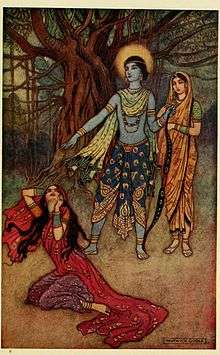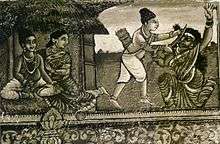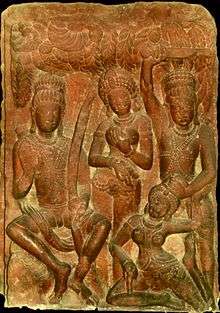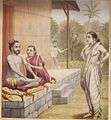Shurpanakha
Shurpanakha (Sanskrit: शूर्पणखा, IAST: śūrpaṇakhā, lit. she whose fingernails are like winnowing fans) is a character in Valmiki's epic, the Ramayana, and is the sister of Ravana, King of Lanka.[1]
| Shurpanakha | |
|---|---|
| Ramayana character | |
 Lord Rama rejects Shurpanakha | |
| In-universe information | |
| Family | Kaikashi (mother), Vishrava (father) Ravana brother Vibheeshana - brother Kumbhakarna - brother Ahiravana - brother |
| Spouse | Vidyutjiva (Dushtabudhi in some text) |
Description and biography
- Thin and curved
- beautiful brown eyes, slightly up tilted
- Thick, long brown hair
- A sweet, melodious voice.
The youngest child of Rishi Vishrava and his second wife, Kaikesi , Shurpanakha was given the name of Mīnakṣī "Dīkṣa" at birth, and some also called her "Candraṇakhā" (the one with nails like the moon). As beautiful as her mother Kaikesi and her grandmother Ketumati had been before her, Shurpanakha grew up and secretly married the Danava prince of the Kalkeya Danava clan, Vidyutjihva. Ravana became enraged with Shurpanakha for marrying a Danava. The Danavas were the mortal enemies of Rakshasas, and he was about to punish her, but Mandodari convinced him to respect the wishes of his sister. Thus Ravana accepted Shurpanakha, her husband and Danavas as relatives officially.
At the time of conquering Rasatala (the underworld), her brother, Ravana decided to visit his newly married sister, where he discovered Vidyutjihva's true motive to marry Shurpanakha – to kill Ravana. In Shurpanakha's absence, Vidyutjihva attacked Ravana, who in self-defense killed his brother-in-law.[2] This earned Ravana his hurt and miserable sister's great displeasure, and the widowed Shurpanakha then split her time between Lanka and the woods of Southern India, sometimes living with her forest-dwelling Asura relatives, Khara and Dushana, on Ravana's orders. She also had conceived a son by Vidyutjihva known as Shambhri who was accidentally killed by Lakshmana.

According to Valmiki, she met the exiled Prince Rama of Ayodhya, during one such visit to the Forest of Panchavati, and was instantly smitten by his youthful good looks. Rama meanwhile kindly rejected her advances, telling her that he was faithful to his wife Sita and thus would never take another wife. Rejected, Shurpanakha then approached his younger brother, Lakshmana, who reacted in a harsh and cruel manner and said she was not what he desired in a wife. Eventually seeing that the brothers were making fun of her, the humiliated and envious Shurpanakha attacked Sita but was thwarted by Lakshmana, who cut off her nose and left ear and sent her back to Lanka.
Shurpanakha first went to her brother Khara, who sent seven Rakshasa warriors to attack Rama, who easily despatched them. Khara himself then attacked, along with 14,000 soldiers, all of whom were killed except for Akampana, Sumali's son and Kaikesi's brother, who fled to Lanka. She then fled to Ravana's court and spoke to her brother of the disgrace she had suffered. Her brother, hearing of Sita’s beauty, decided to kidnap Sita. Akampana too played a key role in instigating , Ravana. Despite opposition from their brother, Vibhishana (who considered as a traitor but some people worship him as a deity), Ravana kidnapped Sita, triggering the Battle of Lanka. Some stories say Suparnakha and Sita eventually forgave each other, and that the two became friends.
Although Shurpanakha receives no further mention from Valmiki, it has been suggested that she continued to live in Lanka after Vibhishana succeeded Ravana as king. She and her half-sister Kumbini are supposed to have perished at sea a few years later.
Alternative accounts
Some versions of the Ramayana claim that Shurpanakha had no real romantic interest in the brothers, engineering Ravana's death in revenge for her husband Vidyujjihva's murder. After many years of plotting his downfall, she realized that Ravana had more than a match in Rama, who had killed both her brothers, Khara and Dushana who confronted Rama and Lakshamaņa after they were told of insult to Shurpanakha's fate by the duo. Her cousins were terrified of Rama, so Shurpanakha decided to pit her brother against Rama, knowing only that he was powerful enough to slay her brother.
Another account, from Volga's book Liberation of Sita, mentions that Shurpanakha was a beauty who highly prized her looks. She had a passing crush when she saw Lakshamana in the forest, and was not aware that he was already married. When she approached to show her interest in him, he became offended and in an extreme reaction of rage, cut off her nose, rendering her ugly. Eventually, after years in solitude and reflection, she reached peace with her inner self and recreated the beauty she so valued in an enchantingly magical garden, that Sita stumbles upon much later during her exile at Valmiki's Ashram.
Gallery
 Lakshmana defends Sita and fights against Shuparnakha
Lakshmana defends Sita and fights against Shuparnakha Śūrpaṇakhā attacked Sitā but was thwarted by Lakṣmaṇa, who cut off her nose and left ear
Śūrpaṇakhā attacked Sitā but was thwarted by Lakṣmaṇa, who cut off her nose and left ear Śurpaṇakhā gets insulted
Śurpaṇakhā gets insulted Shurpanakha Asks for Rama's Love
Shurpanakha Asks for Rama's Love Rama rejects the Surpanaka
Rama rejects the Surpanaka
References
- Johnson, W.J. (2009). A Dictionary of Hinduism (1st ed.). Oxford: Oxford University Press. doi:10.1093/acref/9780198610250.001.0001. ISBN 9780191726705.
- Valmiki Ramayan by Rajshekhar Basu - Uttarkanda
- Ramayana, A condensed prose version of the epic by C. Raja Gopalachari. Published by Bhavan's Book University
- Valmiki. Ramayana: Aranya Kandha
- Valmiki Ramayan by Rajshekhar Basu - Uttarkanda
External links
| Wikimedia Commons has media related to Surpanakha episode. |
.jpg)